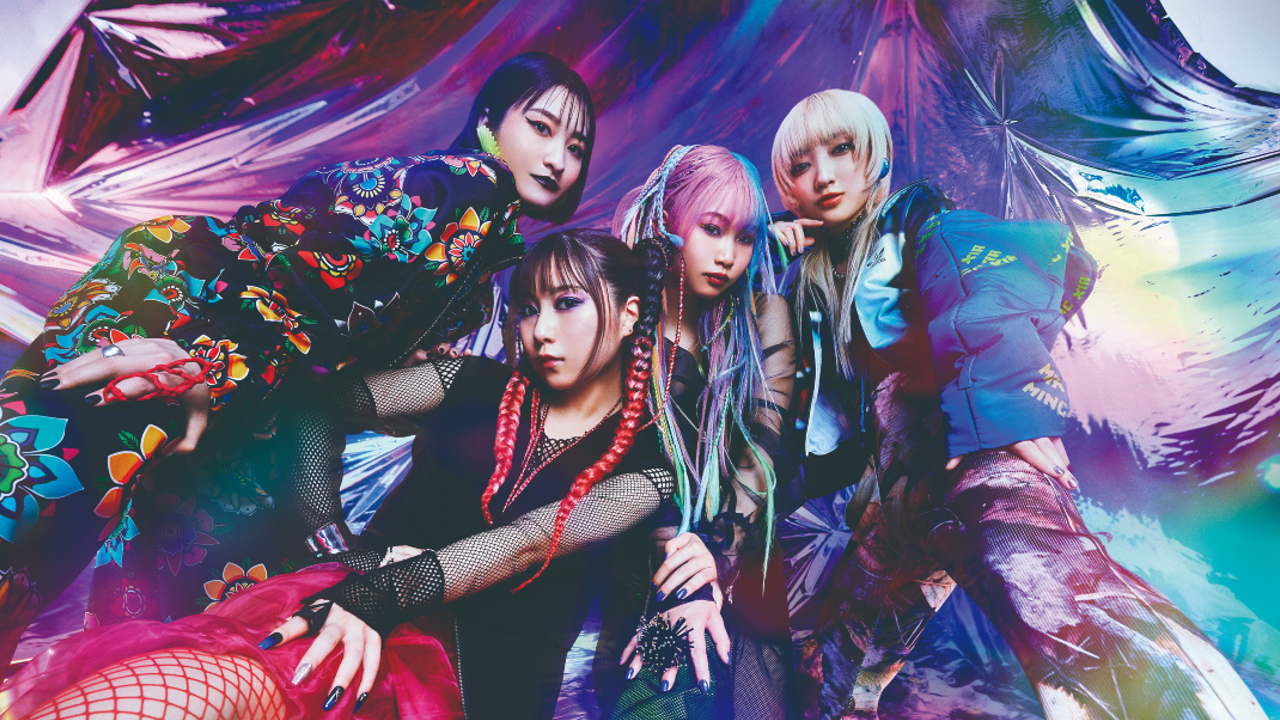
There's a moment in the video for Hanabie’s Osaki Ni Shitsurei Shimasu (Pardon Me, I Have To Go Now), where singer Yukina grabs her boss by the neck and screams in his face. It’s the culmination of a day in the office where she’s carried out a string of tedious tasks, from tea-making to photocopying, all while being patronised, and is then expected to go for drinks in the evening. Funny and relatable, it’s one of the reasons – along with the bouncy chorus and instrumentation from Japanese stringed instrument the shamisen – the song went viral in January.
“In Japan, whether you’re working in a corporate atmosphere or even in the music industry, when you go out drinking with people, there’s this phrase that you say: ‘Osaki Ni Shitsurei Shimasu’. It means, ‘Pardon me, I have to go now,’” explains guitarist Matsuri of the title. “It’s a really convenient phrase you can use to excuse yourself without being rude, and it’s very distinctive to Japanese culture. We wanted to talk about that phrase and that culture in a way that’s witty.”
When we meet Hanabie at an Italian bistro in Tokyo, they’re giggling about beer. They’ve been given moderately sized glasses, while their male manager has been given a tankard – where’s the fairness in that? We chat about Y2K fashion, cute Sanrio characters, ice cream. Unlike Japanese idol bands such as Babymetal, or stylised power metal bands like Lovebites, Hanabie project a Gen-Z image of relaxation, messiness and authenticity. There’s a clear bond between the girls, likely because Yukina, Matsuri and bassist Hettsu – alongside former drummer Kaede – met in junior high in Tokyo, before forming Hanabie during their first year of high school, in May 2015. Yukina was 16 years old, her bandmates 15. Their name reflects the fact Yukina was born in spring while the others were born in winter: ‘Hana’ means ‘flower’, and ‘bie’ means ‘cold’.
Hanabie’s music is a high-energy fusion of metalcore and electronics – the soundtrack to a neon-splattered cyberpunk videogame. Above all, it’s fun. Yukina – who instantly flips from singing and rapping to guttural screams – likes punk and metalcore, Matsuri’s into hardcore, and Hettsu rates anime soundtracks. As Japan’s biggest metal export, Westerners might be tempted draw comparisons to Babymetal – especially since Hanabie have a song called We Love Sweets – but their main influence is Tokyo metal quintet Maximum The Hormone, who hop between subgenres and are known for their tongue-in-cheek videos.
“I first heard Maximum The Hormone when I was in junior high, and it was the first time I’d heard such intense, heavy metal music,” explains Yukina, who was aware of metal due to the manga series K-On!, which features a character in a death metal band, but didn’t know much about it. “A senior at my school was in a Maximum The Hormone tribute band, which was really inspiring.”
“I first heard them in junior high too, and my dad listened to them at home,” adds Matsuri. “At first I thought it was scary, but more and more I started liking the sound. So then I started listening to the other CDs that my dad had, going to the nearby CD store, and diving into the entire genre.”
As four women in their mid-20s, Hanabie write about their day-to-day lives, with punchy lyrics often concealing deeper truths. For their debut album, 2021’s Otome Kaikaku (Girl’s Reform Manifest), they penned a song called Reiwa Dating Apps Generation (Reiwa is the current era of Japan’s official calendar, which began in 2019, when Emperor Naruhito ascended the throne). The video borders on the explicit and has a sinister conclusion.
“It’s a Gen-Z song,” confirms Yukina. “Now in this Reiwa era, people are meeting each other through matching apps, so it’s a song that says, ‘Wow, what a time we live in.’ You’re going to be meeting strangers, so the song is a shoutout of caution to people.” “The fun bit is that you’re able to meet people who have similar hobbies to you, and people you wouldn’t necessarily meet otherwise,” adds Matsuri. “The challenging bit is that you hear stories from friends about dangerous situations they faced because of that.”
Now signed to Sony and with their line-up completed by new drummer Chika, you can expect more of the same from new album Reborn Superstar!. Their music is even more hyper, Yukina’s vocals even more brutal. In between the rock-club-ready riffs, Warning! highlights social media addiction while Neet Game celebrates videogaming at the same time as acknowledging its potential downsides.
“Since I really like games, I wanted to create a track that incorporates sounds from them”, explainsMatsuri. “And then we said, ‘If it has game sounds in it, the lyrics should also be about games.’ But it also carries this message about people who are at home all the time, because they’re playing games. It encourages these people to come out of the house and see gigs in person.”
As the three original members of Hanabie have known each other for 12 years, they consider each other family. Yukina sees Matsuri as their leader. “She’s serious and she’s cool, but on the other hand she’s sometimes a klutz and there’s a cute side of her,” Yukina smiles. “I would describe her as a ‘super-interesting genius’.”
Matsuri reciprocates those feelings. “A lot of times, people think of Yukina as this cute woman that has a soft kind of look and way about her, but on the inside she’s actually cool and serious about what she does, and she also has talents that I don’t have,” says Matsuri. “So Yukina called me a genius, but I also consider her a genius.”
With genius-level skills to call on, international shows on their touring schedule and an ultimate ambition to become a household name, it doesn’t look like Hanabie will be forced to endure the tedium of office culture any time soon.
Originally published in Metal Hammer #377







